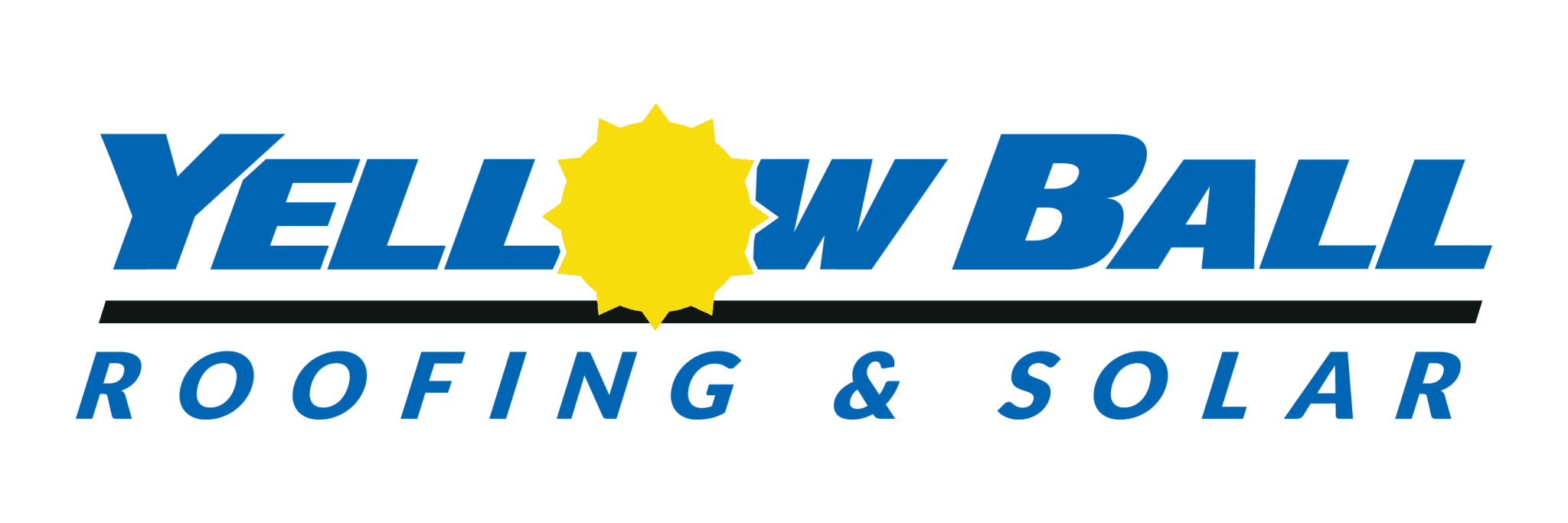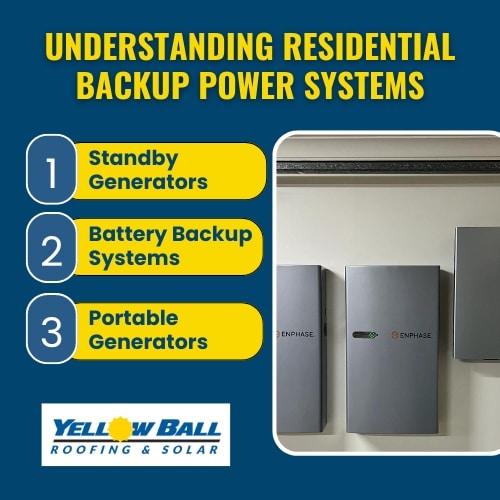Power outages can strike at any moment, leaving us in the dark and disconnected from our increasingly electrified lives. That’s where residential backup power systems come in, offering a lifeline when the electrical grid goes down.
But with so many options available, from traditional generators to cutting-edge battery systems, how do you choose the right solution for your home?
Let’s shed some light on residential backup power systems and explore how they can keep your lights on, your fridge running, and your life moving forward even when the power’s out.
Ready to power your home with reliable, uninterrupted energy? Contact YellowBall Roofing & Solar today and explore our residential backup power systems.
Understanding Residential Backup Power Systems
Residential backup power systems are designed to kick in automatically when your main power supply fails. Let’s break down the main types:
Standby Generators
Standby generators have long been the go-to solution for home backup power. These workhorses can run for extended periods, as long as they have a fuel supply. According to Petro, good-quality generators can operate for up to 3,000 hours with proper maintenance.
Standby generators usually operate on natural gas, propane, or diesel fuel. They’re permanently installed outside your home and connect directly to your electrical panel.
When the power goes out, a transfer switch automatically fires up the generator, usually within seconds.
Battery Backup Systems
Battery backup systems, like the popular Tesla Powerwall, are the new kids on the block. These systems store electricity from your home’s solar panels or the grid and provide power during outages.
They’re silent, emission-free, and require minimal maintenance. One of the most significant advantages of battery storage systems is their instant response time.
There’s no lag between the power going out and your backup kicking in – it’s seamless.
Portable Generators
For those seeking a more flexible or budget-friendly option, portable generators or portable power stations can be a good choice. These can be moved around as needed and are great for powering essential appliances during short outages.
However, they require manual transfer and can’t power your entire home like standby generators or larger backup battery systems can.
To power your entire home, you would need a solution such as a standby generator, battery backups, or a solar generator.
For an expert consultation and professional residential backup power systems installation, contact YellowBall Roofing & Solar today for a free quote!
Choosing the Right Residential Backup Power Systems for Your Home
Selecting the ideal residential backup power systems isn’t a one-size-fits-all proposition. Here are some factors to consider:
Power Needs
First, assess your power requirements. Make a list of what you absolutely need to power and calculate their total wattage.
A refrigerator requires a lot of power, so factor that in when assessing your needs.
Fuel Availability
If you’re considering a generator, think about fuel access. Do you have a natural gas line? Is propane delivery reliable in your area?
For battery systems, consider whether you have or plan to install solar panels to help keep the batteries charged.
You can avoid peak electricity rate hours by utilizing solar energy to charge your battery system. Backup generators require fuel such as propane or natural gas to run.
Installation and Maintenance
Standby generators and whole-home battery systems require professional installation. According to Angi, installing a battery system like the Tesla Powerwall can add between $11,500 and $32,500 to your total cost.
Factor in ongoing maintenance costs as well – generators need regular servicing, while batteries generally require less upkeep.
Environmental Impact
If reducing your carbon footprint is a priority, battery systems paired with solar panels offer the greenest solution. They produce no emissions during use and can help you maximize your renewable energy usage.
Consider if you would need an expansion battery as well.
The Rise of Smart Backup Power
The latest residential backup power systems are getting smarter. Many now come with apps that allow you to monitor power usage, system health, and even control your backup power remotely.
For example, some systems can predict weather events that might cause outages and automatically charge up in preparation.
Others can integrate with your home’s smart devices to prioritize power to essential systems during an outage.
Making the Right Choice for Your Home
Choosing which is the right residential backup power systems is a significant decision that requires careful consideration of your specific needs, budget, and long-term goals. Here are a few final tips to guide your decision:
- Assess your power needs during an outage. What are your must-have appliances and systems?
- Consider your location. Are you prone to frequent, long-lasting outages, or just occasional short ones? How many kWh of storage will you need? How much is your fuel cost?
- Think about your future plans. Are you considering adding solar panels or an electric vehicle to your home?
- Get multiple quotes from reputable installers. They can provide detailed assessments tailored to your home.
- Look into local incentives and rebates. Many areas offer financial incentives for installing clean energy systems. You may qualify for a tax credit by installing solar.
Remember, the best residential backup power systems is one that provides peace of mind and aligns with your values and lifestyle.
Whether you opt for a traditional generator, a cutting-edge battery system, or a hybrid solution, you’re taking an important step towards energy independence and resilience.
You also may want to look into whether a manual transfer is an option with the system you are considering.
FAQs about Residential Backup Power Systems
What are the benefits of a residential backup power system?
A residential backup power system provides reliable energy during outages, keeping essential appliances running. It offers peace of mind during emergencies and reduces dependency on the grid. Paired with solar power, it can also enhance your home’s energy efficiency.
Can I integrate solar power with a backup system?
Yes, many backup systems can integrate with solar power to store excess energy in a solar battery. This allows you to use clean, renewable energy even during outages. It’s an effective way to improve energy storage and sustainability.
How long can a backup power system run during an outage?
The duration depends on the system size and the power demands of your home. Some systems are designed to run for several hours, while larger setups can power your home for days. Pairing the system with energy storage solutions like a solar battery can extend its runtime.
Smart, Safe, and Essential: The Future of Residential Backup Power
Residential backup power systems have come a long way from the noisy, fuel-guzzling generators of the past. Today’s options offer cleaner, smarter, and more efficient ways to keep our homes powered through outages and beyond.
As extreme weather events become more common and our reliance on electricity grows, these systems are no longer just a luxury – they’re becoming an essential part of modern home infrastructure.
Carbon monoxide is a concern with generators, but advancements have been made to make them safer.
Whether you’re looking to power your whole home during extended outages or just keep the essentials running, there’s a residential backup power solution out there for you.
Turn your home into a symbol of energy resilience and sustainability. Contact YellowBall Roofing & Solar for advanced backup power solutions that boost efficiency and reliability.
Start your journey to a more sustainable and secure home today.





